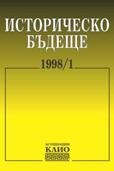Националната идея у българите 1762–1912
The Modern Bulgarian Concept of National Identity, 1762–1912
Author(s): Ilia TodevSubject(s): History
Published by: Асоциация Клио
Keywords: Bulgarian national identity; Paisiy Khilendarski; Neofit Bozveli; Church; National Revival; Enlightenment
Summary/Abstract: The present study has, as its starting point, the widely accepted view that Paisy Khilendarski was the author of the modern Bulgarian concept of national identity. In its essence, this concept aimed at preserving and perfecting the sense of national identity of those Christians who spoke Bulgarian and called themselves Bulgarians. It drew its arguments from Bulgarian history and inevitably led to a conflict with the Greeks and the Greek-dominated Patriarchate of Constantinople. The first true successor of Paisy was Neofit Bozveli who interpreted Paisy's concept of Bulgarian national identity in the light of the Bulgarians' struggle for ecclesiastical autonomy. In 1870, the movement for an all Bulgarian autonomous church scored partial success. By the turn of the century, the diocese of the autonomous Bulgarian church spread out to include most of Thrace and Macedonia. In Bulgaria, the nation-building processes have certain peculiarities which are largely due to the ecclesiastical nature and the historical background of the modern Bulgarian concept of national identity. From a modern point of view, the most important of the above-mentioned peculiarities is the genesis of macedonism whose name is derived from the historic name of Macedonia. Typologically, the modern Bulgarian nation which came into being during the National Revival period, could be attributed to the ecclesiastical type of nation which, in itself, is a version of Fr. Meineke's Kulturnation.
Journal: Историческо бъдеще
- Issue Year: 1998
- Issue No: 1
- Page Range: 90-102
- Page Count: 13
- Language: Bulgarian
- Content File-PDF

